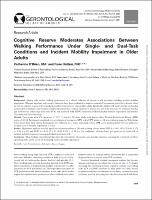Please use this identifier to cite or link to this item:
https://hdl.handle.net/20.500.12202/9371| Title: | Cognitive reserve moderates associations between walking performance under single- and dual-task conditions and incident mobility impairment in older adults. |
| Authors: | Holtzer, Roee O’Brien, Catherine 0000-0001-6639-0724 |
| Keywords: | Gait Physical function Risk factors Successful aging older adult mobility walking speed cognitive reserve short physical performance battery |
| Issue Date: | 2021 |
| Publisher: | Oxford UP |
| Citation: | O’Brien, C., & Holtzer, R. (2021). Cognitive reserve moderates associations between walking performance under single- and dual-task conditions and incident mobility impairment in older adults. The Journals of Gerontology: Series A, 76(10), e314–e320. https://doi.org/10.1093/gerona/glab178 |
| Series/Report no.: | The Journals of Gerontology: Series A,;76(10) |
| Abstract: | _Abstract_ _Background_ Among older adults, walking performance is a reliable indicator of adverse health outcomes including incident mobility impairment. Whereas, attention and executive functions have been implicated in cognitive control of locomotion, much less is known about the role of cognitive reserve (CR) in predicting mobility impairments among older adults. Specifically, whether CR moderates the relationship between gait performance and incident mobility impairment has not been reported. To address this gap in the literature, we examined whether gait performance under single-task walk (STW) and dual-task walk (DTW) conditions predicted incident mobility impairment and whether CR moderated this relationship. _Method_ Participants were 176 (mean age = 75.57; % female = 53) older adults with baseline Short Physical Performance Battery (SPPB) scores of 10–12. Participants completed neuropsychological testing, the SPPB, and a DTW protocol. CR was evaluated using the Wide Range Achievement Test, third edition. Participants were followed for 3 years; individuals whose SPPB scores declined below 10 were defined as incident cases of mobility impairment (n = 42). _Results_ Moderation analyses revealed significant interaction effects of CR with walking velocity under STW (b = 0.09, 95% CI [0.01, 0.17], z = 2.30, p = .02) and DTW (b = 0.10, 95% CI [0.02, 0.17], z = 2.55, p = .01) conditions, wherein slower gait predicted increased risk of incident mobility impairment among individuals with lower CR. _Conclusion_ These findings extend knowledge about the interrelation of cognitive and mobility functions, revealing the critical role of CR in identifying older adults at risk of developing incident mobility impairment. |
| Description: | Scholarly article / Open access |
| URI: | https://academic.oup.com/biomedgerontology/article/76/10/e314/6307374#google_vignette https://hdl.handle.net/20.500.12202/9371 |
| ISSN: | ISSN: 1079-5006, 1758-535X. |
| Appears in Collections: | Ferkauf Graduate School of Psychology: Faculty Publications |
Files in This Item:
| File | Description | Size | Format | |
|---|---|---|---|---|
| Holtzer 2021 OA Cognitive Reserves Moderates glab178.pdf | 235.61 kB | Adobe PDF |  View/Open |
This item is licensed under a Creative Commons License

